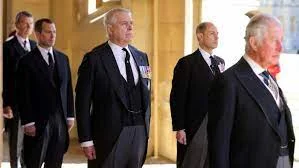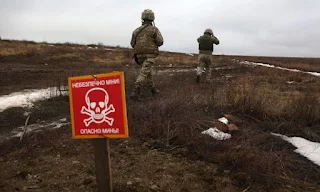Sexual assault suspect: Buckingham Palace revokes Prince Andrew's royal privileges
The withdrawal of Prince Andrew's royal and military privileges came after his lawyer failed to persuade a US judge to dismiss a lawsuit against him accusing him of sexual abuse.
Buckingham Palace announced Thursday that Britain's Prince Andrew has abdicated his military and royal duties.
The move came after Andrew's lawyers failed to persuade a US judge to dismiss a lawsuit against him accusing him of sexual abuse.
Buckingham Palace said Prince Andrew's military ranks and titles and his royal patronage had been returned to Queen Elizabeth II "with her consent and consent".
Buckingham Palace said in a statement: "With the Queen's consent and acceptance, the military ranks and titles of the Duke of York and royal patronage have been restored to the Queen. The Duke of York will continue not to perform any public duties and will defend himself in this cause as any private citizen."
The palace statement came after more than 150 Navy and Army veterans wrote to the Queen asking her to strip Andrew of all his military ranks and titles, amid continuing legal troubles for the prince, who is involved in a sexual assault case, in the United States.
A US district judge on Wednesday refused to dismiss a civil case against Andrew brought by Virginia Joffrey, an American woman who alleges that the prince sexually assaulted her when she was 17.
District Judge Louis A. Kaplan, an argument by Andrew's lawyer that Joffrey's lawsuit should be dropped early on due to an old legal settlement she had with Jeffrey Epstein, the financier who she claims arranged the prince's sexual encounter.
He stressed that he does not judge the truth of the allegations.
Andrew's lawyers said the prince never sexually or physically assaulted Joffrey, and that he "categorically denies Joffrey's false allegations against him".
The King of the Netherlands decides not to use a royal chariot because of colonialism, What is the relationship?
The King of the Netherlands Willem-Alexander has announced that he will not use the "golden carriage" that the Dutch used to see ferrying kings through the streets of The Hague to the opening of Parliament each September.
The Dutch king decided Thursday not to use the royal family's "golden chariot", at least for now, one side of which bears a plaque that critics say glorifies the Netherlands' colonial past, including its role in the global slave trade.
The announcement was an acknowledgment of the heated debate over the chariot, as the Netherlands prepares to deal with the darker sides of its history as a colonial power in the seventeenth century, including Dutch merchants who made fortunes from the slave trade.
King Willem-Alexander said in a video: “The golden chariot will only be able to move again when the Netherlands is ready, which is not possible at the moment.”
One side of the car is adorned with a painting called “Salute from the Colonies” showing blacks and Asians, one kneeling, displaying merchandise to a seated white young woman symbolizing the Netherlands.
The carriage is currently on display in a museum in Amsterdam after a long restoration process. It was previously used to transport Dutch kings through the streets of The Hague to the opening of Parliament each September.
Despite his decision not to use the carriage, the king said: “There is no point in condemning and excluding what happened from the perspective of our time. Simply banning historical pieces and symbols is certainly not a solution. Instead, we need concerted efforts that deepen our bonds...an effort that unites us rather than divides us.”
Russia says Ukraine talks are deadlocked, Poland warns of war risk
Europe's foreign minister said on Thursday that Europe was in danger of going to war , while Russia said it had not yet given up on diplomacy, but military experts were preparing options in case it failed to ease tensions over Ukraine.
In Washington, the White House said that the risk of a Russian invasion of Ukraine remains high, with the deployment of nearly 100,000 Russian soldiers, and the United States will publish within 24 hours intelligence information indicating that Russia may seek to create a pretext to justify the invasion.
"The drums of war are resounding loudly, and the tone of the rhetoric is becoming more and more intense," Michael Carpenter, the US ambassador to the Organization for Security and Cooperation in Europe, said after talks with Russia in Vienna.
"The risk of a military invasion is high," US National Security Adviser Jake Sullivan told reporters. "No dates have been set for any further talks," he added. We must consult with allies and partners first.”
For its part, Russia said that the dialogue is continuing but has reached a dead end, while seeking to persuade the West to prevent Ukraine from joining NATO and stop the alliance's expansion in Europe, which are demands that the United States has described as impossible.
"At this point, it's really frustrating," Russian Ambassador Alexander Lukashevich told reporters after the meeting of the Organization for Security and Cooperation in Europe, the third stop in a series of East-West talks this week.
He warned of "catastrophic consequences" if the two sides did not agree on what Russia described as security red lines, but added that Moscow had not yet given up on diplomacy and would rather accelerate it.
Earlier, Polish Foreign Minister Zbigniew Rau told the 57-nation security forum, "It seems that the threat of war in the OSCE region is greater now than at any time in the past 30 years."
His comments highlighted the extent of European concern about Russia's buildup of nearly 100,000 troops near its border with Ukraine.
Russia denies planning to invade Ukraine, but the military buildup has forced the United States and its allies to the negotiating table.
There was no breakthrough at the Vienna meeting, which followed talks between Russia and the United States in Geneva on Monday, and a meeting between Russia and NATO in Brussels on Wednesday, Rau said.
Germany: Life imprisonment for a Syrian officer involved in torturing thousands of detainees
Yesterday, the German judiciary issued a life sentence to a former officer in the Syrian regime's intelligence for convicting him of crimes against humanity, in a decision described as "historic" that comes in the context of the first case in the world linked to atrocities attributed to the President's regime. Bashar al-Assad.
The Regional High Court in Koblenz (western Germany) ruled that Syrian Anwar Raslan (58 years) was responsible for the killing of detainees and the torture of thousands of others in a secret regime detention center in Damascus, between 2011 and 2012. It is the second verdict issued by the German judiciary in this trial after the conviction of another lower-ranking Syrian intelligence officer in February 2021.
The judges acknowledged Raslan’s guilt in the killing of 27 people in this center, which was referred to as belonging to the Investigations Department – Branch 251 and is known as “ State Security - Al-Khatib Branch” in Damascus. Anwar Raslan, who used to head the investigations division in Branch 251 of the widespread state security apparatus, remained silent throughout the sessions of this trial, which began on April 23, 2020.
On Thursday morning, he listened to the court's ruling, which was simultaneously translated into Arabic, without appearing emotional. , according to an AFP correspondent. The United Nations High Commissioner for Human Rights, Michelle Bachelet, praised the ruling, calling it a "historic leap forward" towards greater justice.
She added that this ruling "will constitute a strong deterrent and contribute to the prevention of atrocities in the future."
Human Rights Watch and Amnesty International praised this ruling, describing it as “historic.” "I hope that we have given a voice to the voiceless" in Syria, Wassim Miqdad, one of the plaintiffs for civil rights in this case, told AFP, stressing that "all I want is to achieve the right and not to take revenge or revenge."
Raslan was accused of overseeing the killing of 58 people and torturing 4,000 others in the intelligence branch known as “Al-Khatib Branch” in Damascus. And this former officer became exposed when he was introduced to him on a street in the German capital, the Syrian lawyer and dissident Anwar al-Bunni, who is now following up the files of former collaborators with the refugee regime in Europe. According to lawyer Anwar al-Bunni, who is familiar with the investigations of “Al-Quds Al-Arabi”, Raslan was arrested by the German police based on a decision of the Public Prosecutor for International Crimes in February 2019, and the Public Prosecution charged him with torturing more than four thousand detainees, and causing the death of 58 Detained under torture, in addition to other charges related to rape and sexual violence.
The decision was widely welcomed by Syrian opponents, as political researcher Muhammad Munir al-Khatib wrote, "Today's sentencing of former State Security officer Anwar Raslan to life imprisonment is a point of light on the long road to accountability and justice."






